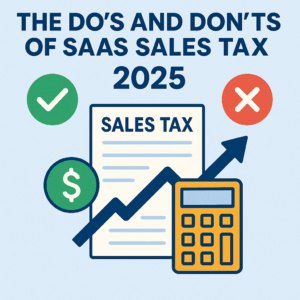SaaS Sales Tax 2025: The Do’s and Don’ts of Staying Compliant
The SaaS sales tax 2025 landscape is more complex — and more important — than ever. With over half of U.S. states taxing cloud-based software, businesses selling Software-as-a-Service need to know how to navigate these rules. Below are the key do’s and don’ts to help your business stay compliant, avoid penalties, and maintain customer trust.
Why SaaS Sales Tax Compliance Matters in 2025
More states than ever classify SaaS as taxable. Inconsistent state rules, evolving laws, and aggressive enforcement have caught many businesses off guard. Failure to comply can result in audits, back taxes, penalties, and damaged credibility.
✅ Do’s of SaaS Sales Tax Compliance
1. Do Identify Where You Have Nexus
Economic nexus thresholds mean you may owe sales tax even without a physical presence in a state. Monitor your sales volume and transactions by state.
2. Do Understand Each State’s Rules
Some states treat SaaS as taxable software, others as a service, and a few exempt it entirely. Always check how each jurisdiction defines and taxes SaaS — state revenue department websites are the best source.
3. Do Register and Collect When Required
Once you determine nexus and taxability, register with the appropriate states, charge the correct rate, and remit the taxes you collect.
4. Do Keep Accurate, Current Records
Document all sales, taxes collected, exemption certificates, and remittance filings. Laws change often — stay informed through official state tax bulletins.
🚫 Don’ts of SaaS Sales Tax Compliance
1. Don’t Assume SaaS is Always Exempt
Too many businesses believe SaaS is intangible and therefore exempt. Many states disagree and explicitly tax it.
2. Don’t Rely on Outdated Information
State laws evolve rapidly, especially for digital goods. Review official guidance at least annually to stay current.
3. Don’t Delay Compliance
Failing to act can lead to audits and significant liabilities. Voluntary compliance is usually less expensive than waiting for enforcement.
4. Don’t Neglect Professional Help
SaaS sales tax compliance is nuanced. Consult with a tax advisor familiar with digital goods and multi-state rules.
Why Act Now?
The SaaS sales tax 2025 environment is evolving quickly. Proactive compliance protects your business, strengthens customer trust, and positions you for growth.
Links:
– Contact TaxLane
– IRS State Government Links
—
**Disclaimer:** The information provided in this blog post is for informational purposes only and should not be construed as legal, tax, or accounting advice. Tax situations are often complex and highly specific to the individual or business. You should contact a qualified tax expert directly to discuss your particular circumstances. Nothing herein is intended to, nor does it, create an attorney-client or advisor-client relationship. For individual guidance, please contact us directly.



